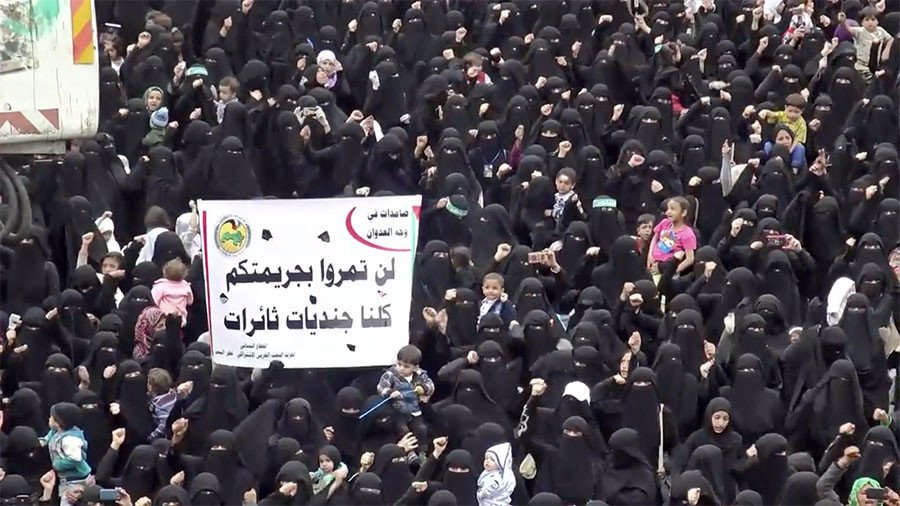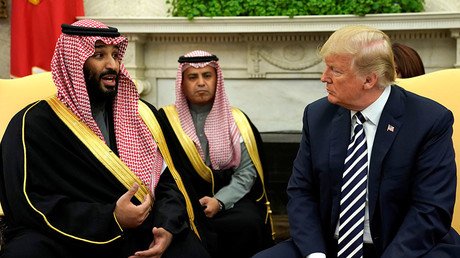'US may try to stay at arm’s length, but its weapons are being used in Yemen'

The US may try to distance itself from the Yemen crisis, but it is involved as it sold the Saudis billions in arms and its weapons are used to kill civilians, says Jack Rice, former CIA officer and international lawyer.
Thousands of women rallied in Yemen on Monday against the actions of the Saudi-led coalition. They came out to express their anger, following the alleged rape of a local girl. According to several Yemeni NGOs, a soldier fighting in the Saudi-led coalition is responsible for the crime.
Earlier, US Defense Secretary James Mattis said that the Pentagon is advising Saudi Arabia on how to avoid civilian casualties in Yemen. The US has a long history of supporting the coalition, including weapons sales.
RT spoke to former CIA officer Jack Rice, who believes that US-Saudi arms deals have an enormous impact on the plight of civilians in Yemen.
RT: Mattis said that the US is showing the Saudis ‘no-strike zones’. The Saudis keep killing civilians with their airstrikes though. What does this mean? Is the US giving the wrong advice? Or are the Saudis not paying attention? Or would the situation be even worse if the US wasn’t helping the Saudis?
Jack Rice: The real problem that we have right now is that the Saudis continue to kill civilians. And the real problem that we have in any war zone is that if there are fire fights between combatants, I think that is logical, sadly, and realistic, but the idea that it is civilians who continue to pay the heavy price in Yemen is simply unacceptable. Whether or not it is Saudi or whether or not it is American-led, American-controlled or even American-advised – that is no excuse. There is no justification.
RT: We have seen cases of Saudi Arabia’s airstrikes hitting weddings and religious ceremonies, hospitals, schools. Sometimes these are so-called ‘double tap’ strikes. What can this tell us about the way they are planning their strikes?
JR: That too is difficult to tell because here is what we do know. We are talking about 10,000 dead at this point. We have one of the worst humanitarian crises on the planet right now in Yemen and that has continued. Have things improved a little? In some ways, they have. But they have actually gotten worse in other ways with the cholera epidemic and other issues. The idea that things would be better or worse – it is very difficult to say. Whether or not the American direct military involvement would make it better or worse. In the end, one of the big problems, of course, is the recent American deal with the Saudis selling them €12.5 billion in arms. The Americans may try to stay at arm’s length. But, frankly, they are involved. It is their weapons that are being used.
My biggest concern is that we have seen over and over again civilians seemingly being targeted. We have seen this again… with the apparent targeting of schools, targeting of hospitals, targeting of other civilian zones that have no military bases. Which brings to mind for me what the purpose is. So, we have seen this in large numbers. We have seen this in other war zones as well. But what we are seeing right now are larger than, if we could say this, average hits on civilians. So, this is very disturbing indeed.
RT: Can the US influence Saudi Arabia in a positive way in terms of policy towards Yemen? Is the US at all interested in doing that?
JR: The US can absolutely influence Saudi Arabian foreign policy and their military ventures. The Americans just sold the Saudis $12.5 billion in arms and they provide ongoing military strategic and intelligence support to the Saudis. They do have a very strong influence on the Saudis and the problem right now is that the Americans seem to be just fine with allowing this to continue to play out as it has. I think one of the problems the US has is they have their own ongoing problems with their own credibility in the region. For them to turn around now and tell the Saudis that they have been killing civilians when in fact the Americans and others too, frankly, had similar problems in other war zones, including Syria, may be very difficult for the Americans to do or say anything about that.
















